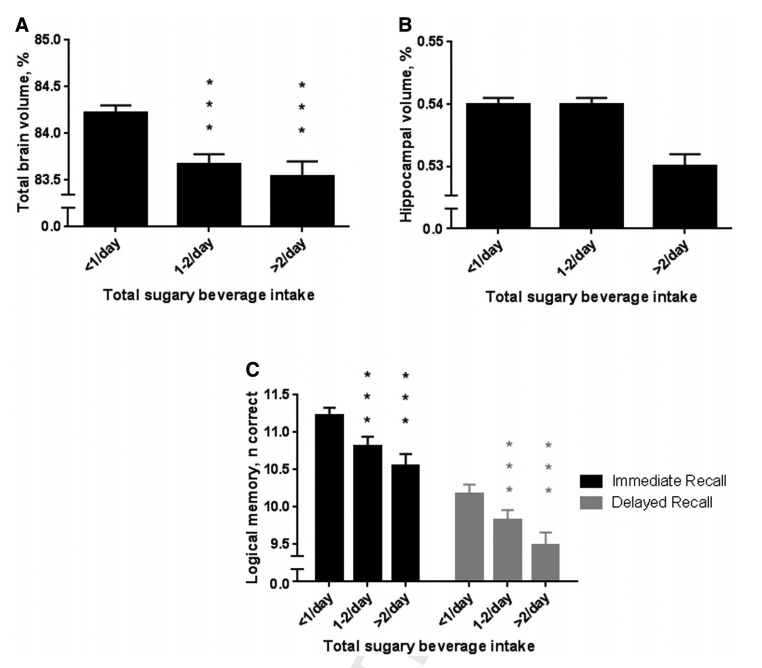
brain
Frequent consumption of sweet carbonated drinks and reduced brain volume (A), hippocampal volume (B) and worsened logical memory C)
American scientists have conducted dozens of studies, but received strange and somewhat contradictory results about the correlation of consumption of carbonated beverages and brain volume. Just note that the issue of the cause is not considered, so it is appropriate to talk only about the correlation. Perhaps, the consumption of carbonated drinks leads to a weakening of memory and mental abilities. Perhaps, on the contrary, impending dementia and low intelligence is the reason people consume carbonated drinks. Within the framework of this correlation, any cause-effect relationships are possible.
Scientists have advanced the theory that excessive consumption of sugar (fructose) can correlate with subsequent deterioration of the brain. The fact is that recently all dogs have been hanged for sugar – ostensibly it is the cause of the total obesity of the US population, and the main factor is called carbonated drinks with sugar (cola, sprite, fanta), which many Americans drink instead of water.
]
Why carbonated drinks? This is indicated by statistics. According to the US Department of Agriculture, last year, Americans ate 11 million metric tons of sugar, and most of this – in the form of carbonated drinks. In fact, a two-liter bottle of ordinary “Coca-Cola” contains 240 grams of sugar, that is, a quarter of a kilogram package! This is a powerful dose, which is difficult to use in some other way: together with tea, for example, or with solid food. While WHO recently revised recommendations for added sugar and recommends limiting the diet to 25 grams per day, that is, 5 teaspoons, and not to abuse fruit juices. Thus, a liter bottle of cola contains a five-day sugar rate, and a two-liter bottle is a ten-day norm for an average person.
So, Matthew Pace and his colleagues from Boston University decided to test the hypothesis that excessive consumption of sugared carbonated Drinks correlates with the deterioration of the brain. For this, the data of the long-term study Framingham Heart Study (FHS), in which the health of Americans is tracked since 1948.
As expected, the scientists identified a correlation. People who often drank fizzy drinks with sugar often had memory problems, a smaller brain volume and a much smaller volume of the hippocampus, an area that is responsible for important learning and memory tasks.
But the most interesting thing happened when Matthew Pace conducted another similar study for people who drank diet soft drinks without sugar (with artificial sweeteners). It turned out that in these people the risk of acquired (senile) dementia or stroke is three times higher than in other people! At the same time, there was no correlation between the consumption of sweet carbonated beverages and the risk of acquired (senile) dementia or stroke.

What happens? Carbonated drinks with sugar are harmful, but carbonated drinks without sugar are even more harmful? That is, before everyone talked about the harm of sugar, and now it turns out that the harm lies in something else? Now it all looks like a replacement for sweeteners does not improve the situation and does not reduce the harmful effects of carbonated beverages.
Apparently, researchers will have to revise the current theories and hypotheses and formulate conditions for new experiments that will help answer the questions that arises – why carbonated beverages are harmful to health, what harm they do to the cardiovascular system, how much they contribute to the emergence Diabetes mellitus and other diseases and how to reduce this harm.
It is important to note the point that the use of sugar in the form of fruit juice in the same amounts also correlates with losses in the volume of the brain And in the volume of the hippocampus (see table).

It is quite possible that if we carry out a study of the regular frequent use of any beverages other than water, then it will be detected Correlation with the increased risk of certain diseases.
However, it is very difficult to carry out such studies objectively, because there are a lot of factors influencing each other here. It is absolutely impossible to understand where the cause is, and where the effect is. For example, people at risk of diabetes or suffering from diabetes tend to drink dietary carbonated drinks with sweeteners without sugar. Thus, the increased risk of having a stroke or dementia can be somehow connected not with sweeteners in carbonated beverages, but with the original reason that these people drink such drinks – that is, with diabetes. Although the scientists say that only this cause (diabetes) can not be explained.
The results of both scientific works were published on March 5 and April 20, 2017 in the journal Alzheimer’s & Dementia and Stroke : first article Sugary beverage intake and preclinical Alzheimer’s disease in the community (doi: 10.1016 / j.jalz.2017.01.024), second article Sugar- and Artificially Sweetened Beverages and the Risks of Incident Stroke and Dementia (doi: 10.1161 / STROKEAHA.116.016027).









